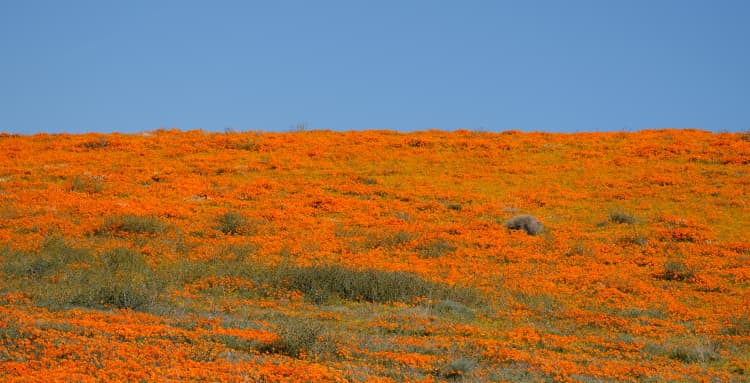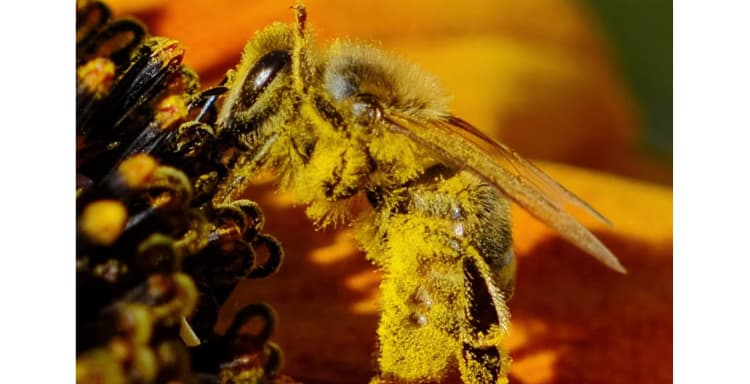
The wild, wet Winter and Spring of 2022/2023 are mercifully over. Thanks to all the rain that drenched San Diego, West Coast headquarters of ChefV.com, there’s a super bloom of flowers. But with the beauty comes the beast of seasonal allergies.
No matter where you live, certified nutritional therapist and ChefV.com founder Veronica “V” Wheat serves up the best foods for fighting seasonal allergies. Dig in!
Before I reveal my top foods for fighting seasonal allergies, let me come to the defense of flowers. You see, I think pollen needs a new publicist. While it’s true that some people are naturally very sensitive to pollen, I don’t think we were put on God’s great green Earth to suffer at the hands of microscopic flower dust.
At the very least, pollen isn’t the only reason that inflammatory molecules like histamine in many people goes rogue, never letting its foot off the immune response accelerator.
I think a big reason for the spike in allergies is exposure to chemicals. That’s why I highly recommend not using household cleaners and beauty products that contain fragrance and other synthetic chemicals.

So is it your imagination? Does it seem like the rate of allergies is skyrocketing? No, it’s not you.
A 2022 study published in the journal, Nutrients, says that a “prevalence of allergic diseases and asthma has increased significantly in the last decades, especially in the western world.” Along with obvious reasons such as poor diet, stress and chemicals, the study offers an interesting theory.
“This phenomenon [increase in allergic diseases] has been attributed mainly to changes in environmental exposures and lifestyle. It is understood that a lack of natural stimulation of the immune system by the microbes from the external environment favors an allergic response. Our hygienic, modern lifestyle lacks sufficient contact with nature and has changed our immunity and reduced the diversity of our internal microbiome.”
In other words, could it be that over-using disinfectants and hand sanitizers has caused a spike in allergies? Hmmm. Food for thought.
Now let’s check out some of my favorite foods for preventing an overactive immune response and seasonal allergies.
1. Bee Pollen
Bee pollen is so last week, when I talked about it at length here. But one thing I didn’t mention: Is using bee pollen the equivalent of fighting fire with fire? After all, if pollen makes people sneezy and go through half a box of tissues, how can consuming bee pollen help? For starters, I should point out that bee pollen is not safe for everybody. Some people may be allergic to it. But if you’re not, bee pollen works by reducing histamine.
A 2008 study showed for the first time that bee pollen inhibits the activation of mast cells. Mast cells secrete histamine and sound the alarm in your immune system.
2. Raw, Local Honey
Pollen isn’t the only functional food from bees. Of course, bees make honey. But not any honey will do for the relief of seasonal allergies. You need to consume raw, local honey. Why raw? Because with regular honey that’s pasteurized, the antioxidants are destroyed. (It’s the same reason Chef V Organic Green Drink is never pasteurized!)
And why is it important to consume local honey? When you consume local honey, you’re getting small amounts of pollen that’s local to your area. This will get your immune system to recognize that pollen is not a threat.
How good is honey overall, according to the research? This 2021 study says that the “therapeutic properties of honey such as anti-microbial, anti-inflammatory, and wound healing have been widely reported. A number of interesting studies have reported the potential use of honey in the management of allergic diseases.”
3. Quercetin-Rich Foods
Quercetin is the queen of antioxidants, and one of the best phyto(plant)-nutrients for getting those mast cells to chill out. So where can you find quercetin? The mighty duo of black kale and green kale, which are 2 of the 7-certified organic leafy veggies in Organic Green Drink.
You can also find quercetin in broccoli, onions, capers, blueberries and apples. I’ll be the first to admit that quercetin won’t work as quickly as Benedryl. So the key is to start eating plenty of these foods before allergy season begins. (You can also take a high-potency quercetin supplement.)
4. Citrus Fruits
No surprise here, because vitamin C acts like a natural antihistamine.
5. Omega-3 Fatty Acids
This is a tricky one for vegetarians because the best sources of omega-3’s are wild salmon and other cold-water oily fish. These fish contain DHA/EPA, which are more potent omega-3 fatty acids than ALA, the vegetarian source.
For vegans, I recommend taking an algae oil supplement. Algae is naturally-high in omega-3s. Salmon feed on algae and this is the reason why they are rich in this anti-inflammatory healthy fat.
Tomato Paste
From what I’ve read, tomatoes are a great seasonal allergy fighter. That’s because they’re high in vitamin C and lycopene, another type of antioxidant. But I don’t think adding a few slices of tomato to a sandwich or salad is going to do you much good if you’re suffering with seasonal allergies.
Instead, I’d go with tomato paste, which is much richer in lycopene per serving than a regular tomato. A 2021 study says that lycopene was “effective in the treatment of allergic rhinitis, and this effect was found to be stronger with increasing doses of lycopene.”
7. Nettle Leaf
Want the sciency explanation how nettle leaf works? Here’s straight from the horse’s mouth (this 2009 study) “Nettle inhibits several key inflammatory events that cause the symptoms of seasonal allergies. These include … activity against the Histamine-1 receptor and the inhibition of mast cell…preventing degranulation and release of a host of pro-inflammatory mediators that cause the symptoms of hay fevers.”
So start drinking nettle tea.
8. Fermented Foods
Remember those researchers from the Nutrients journal who suggested that people aren’t exposed to enough germs in the natural environment as a reason for the soaring rates of allergies?
They also said that we should be consuming more fermented foods like all-natural, sugar-free, plain yogurt, tempeh, kefir and sauerkraut. “The metabolic and enzymatic activity of microorganisms involved in fermentation can exert anti-inflammatory and antioxidant action.”
9. Ginger
A 2016 study in the Journal of Nutritional Biochemistry says that ginger “suppresses cytokine production for T cell activation and proliferation, thereby not causing B cell and mast cell activation and resulting in prevention or alleviation of allergic rhinitis symptoms.”
10. Turmeric/Curcumin
Turmeric’s active ingredient, curcumin, contains potent anti-allergenic properties. A 2016 study showed for the first time that curcumin may “improve nasal airflow and modulate immune response in patients with allergic rhinitis.”
11. Pineapple
Bromelain, the main enzyme in pineapple is best known for supporting digestion. But it also may help reduce inflammation associated with allergies. A 2012 study found that bromelain “was found to [prevent the] development of allergic airway disease (AAD) … From this reduction in AAD outcomes … bromelain may have similar effects in the treatment of human asthma and hypersensitivity disorders.”
12. A Rainbow of Veggies
As if you need another reason to eat veggies! Eating a diverse range of colorful veggies like green leafy veggies in Organic Green Drink, squashes, red bell peppers and carrots ensures that you’re getting adequate antioxidant pigments called carotenoids.
Carotenoids support healthy inflammation levels. But don’t just take my word for it. Says this study:
“High plasma carotenoid concentrations reflecting a diet high in various fruits and vegetables might have a protective effect on allergic rhinitis in adulthood.”
I include many of these seasonal allergy fighters in my recipes, which you can find here.
Good luck this allergy season!
Love,
Veronica “V” Wheat
Founder, ChefV.com












